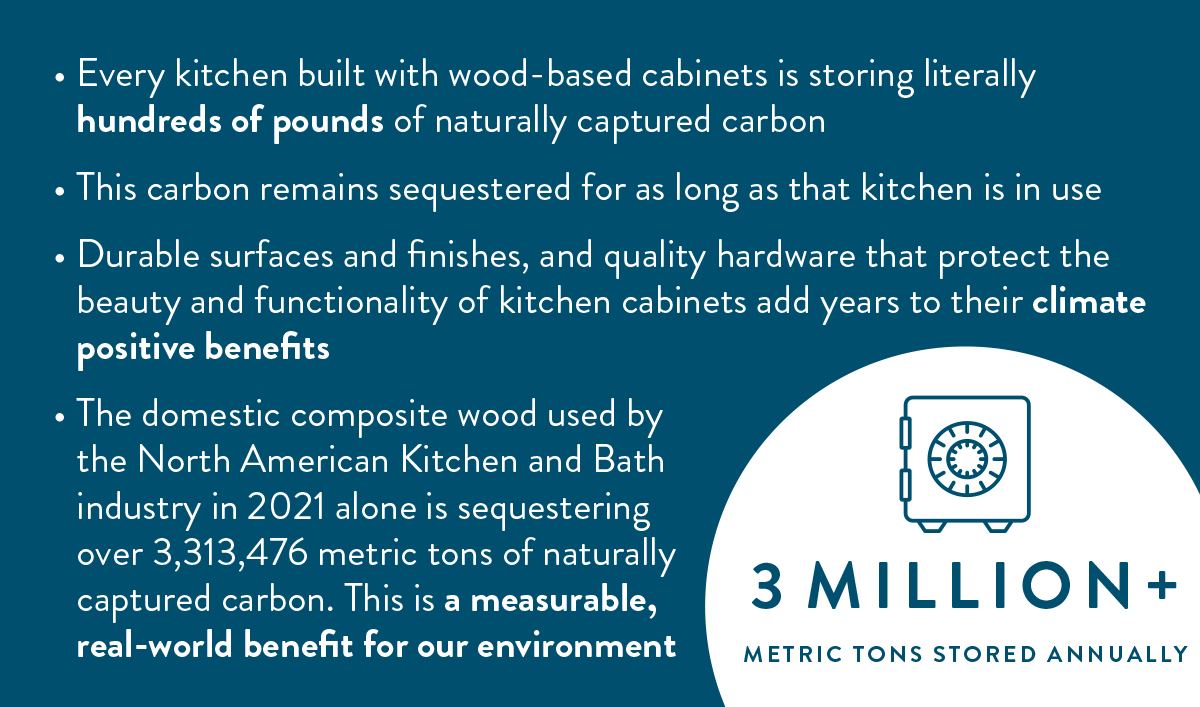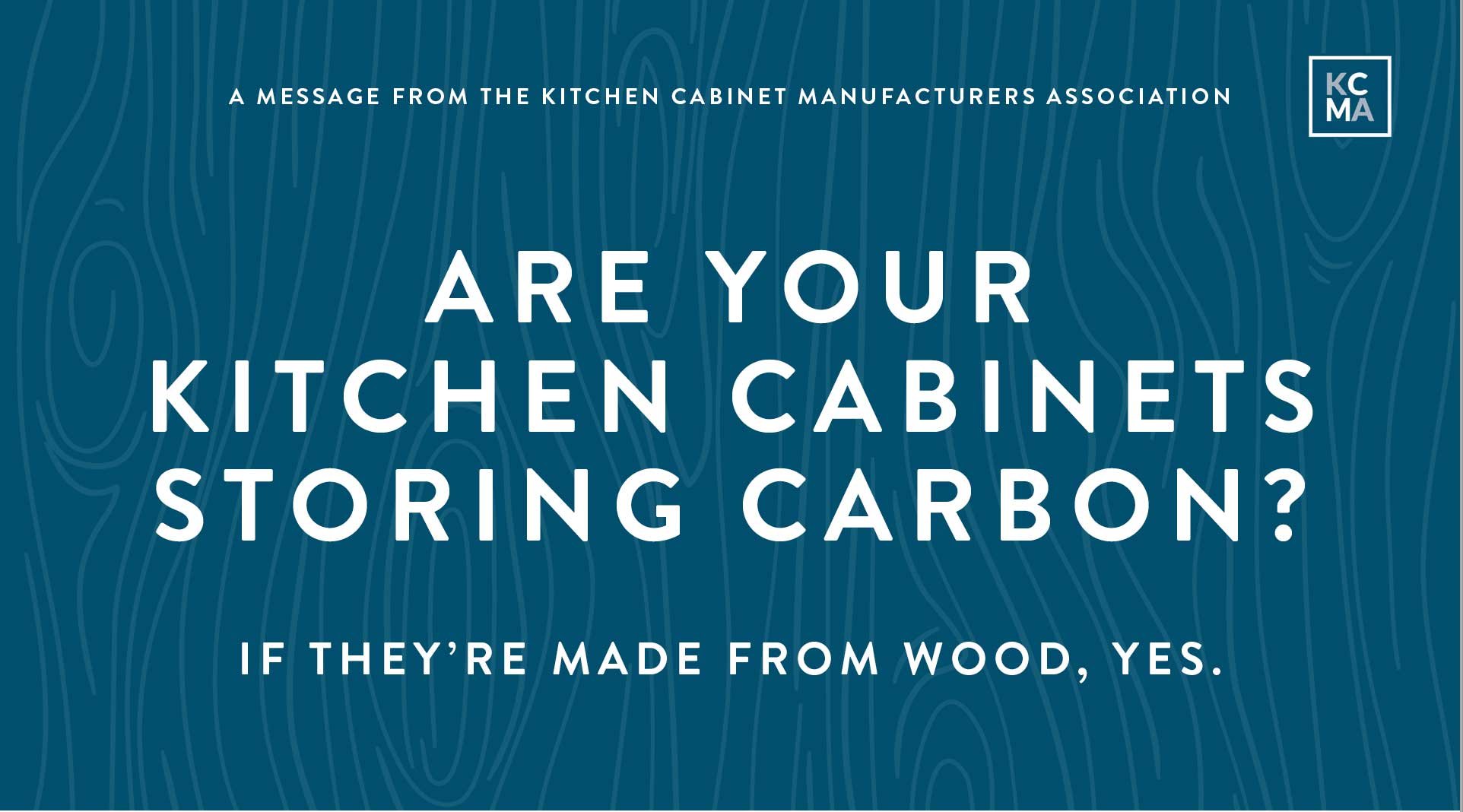KCMA Partners with ClimatePositiveNOW.org to promote use of sustainable, healthy materials
RESTON, VA. -- The Kitchen Cabinet Manufacturers Association (KCMA) and its membership have partnered with the ClimatePositiveNOW.org movement to help educate designers and consumers understand the sustainability advantages of the wood-based materials used in kitchens and cabinets.
A growing body of research is further reinforcing the understanding of wood’s important role in helping mitigate climate change, and how opting for climate-positive materials – products that remove more CO2 from the atmosphere than they release – can “move the needle” on reducing greenhouse gasses.
“We know that trees naturally scrub carbon from the atmosphere and release oxygen,” says KCMA CEO Betsy Natz, “but new data from the Composite Panel Association (CPA) helps us quantify just how much carbon is being stored by the wood used by our members in their cabinetry.”
Natz pointed out that even a small kitchen uses enough wood and composite wood panels to store over 400 lbs. of naturally captured carbon. “That’s more carbon than is released in the production and use of those panels,” she said, “which is why we can say these materials are ‘climate positive.’ With durable decorative surfaces and quality hardware, our members products are keeping this extra carbon out of the atmosphere for decades.”
According to the CPA, the North American composite wood used in kitchens and bathrooms in 2021 alone is sequestering over 3 million metric tons of carbon. This is 1.08 million metric tons more carbon than is released turning that wood into cabinets and substrates for countertops, going beyond achieving net-zero carbon emissions and benefiting the environment by removing extra CO2 from the atmosphere.
“This story, and the science behind it, is clear,” says Andy O’Hare, President of the CPA. “Once a composite panel is sent to a kitchen cabinet manufacturer it has already more than offset the greenhouse gas emissions associated with its production and is capable of storing that carbon for decades. We’re working on further research that goes beyond cradle-to-gate, which will make wood’s sustainability story even stronger.”
“Once a composite panel is sent to a kitchen cabinet manufacturer it has already more than offset the greenhouse gas emissions associated with its production and is capable of storing that carbon for decades.”
—AndyO’Hare, President of the CPA
“This is an incredibly powerful story because buildings are responsible for 40% of global annual CO2 emissions,” says Kenn Busch, President of ClimatePositiveNOW.org. “This is more than the total annual CO2 released by the U.S. and China, combined. Remodeling over the life of a building makes up a big share of these emissions, so this is where smart materials choices will make a difference.
Busch pointed out that that for every kilogram of aluminum produced, nearly three kilograms of CO2 is released. “A kilogram of particleboard, on the other hand, actually has a carbon footprint of negative 1.15 kilograms of CO2,” he explained, “because it’s storing more carbon than was released in its creation and use – it’s climate positive. Armed with this knowledge, all of us can start making more informed decisions about the materials we use.”
In addition to long-term carbon storage, managed forestry practices add to wood’s climate positive story. By continuing the cycle of planting, growing, and harvesting, active management minimizes the likelihood of catastrophic fires and maximizes forests’ ability to clean our air and water, and provide healthy habitats for wildlife. This is why, even with growing demands for wood-based products, the total volume of trees grown in the U.S. is actually increasing, according to the National Alliance of Forest Owners.
“It’s rare to hear a story that’s this good and realize it’s not ‘greenwashing,’” concludes Natz. “Many companies and industries say they are planning to be ‘climate positive’ by 2030 or 2040. We wanted to celebrate that our members are using a material that is already climate positive and encourage our dealers and customers to proudly tell this important story.”
“It’s rare to hear a story that’s this good and realize it’s not ‘greenwashing. Many companies and industries say they are planning to be ‘climate positive’ by 2030 or 2040. We wanted to celebrate that our members are using a material that is already climate positive and encourage our dealers and customers to proudly tell this important story.”
—Betsy Natz, KCMA CEO
For more information, visit the KCMA’s website, or download a free PDF infographic telling this story.
Developed by Material Intelligence, ClimatePositiveNOW.org is a sustainable materials education project inspired by a combination of Kenn Busch’s research into the properties of wood-based architectural materials, and his two decades of experience delivering educational content to interior designers and architects.



